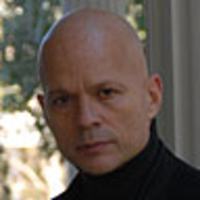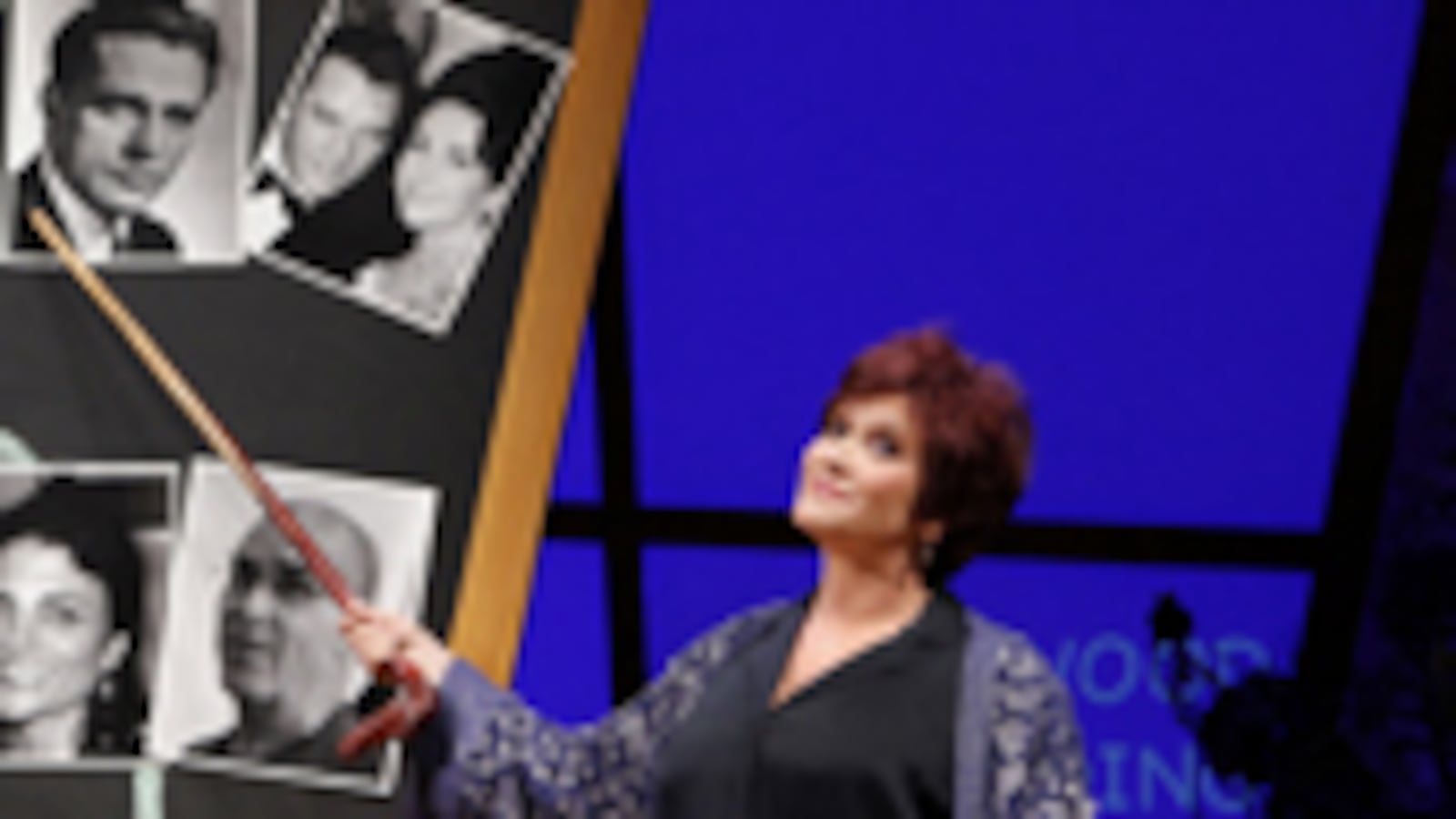
Carrie Fisher is currently starring on Broadway in her one-woman show, Wishful Drinking, based on her bestselling book. In the show, Carrie Fisher as “Carrie Fisher” carries on about her marriages to musician Paul Simon and Hollywood macher Bryan Lourd of CAA, her parents Debbie Reynolds and Eddie Fisher, her resilient daughter Billie Catherine Lourd, her first brush with fame based on her portrayal of Princess Leia in Star Wars, and her battles with addiction and bipolar disorder. Her way with words has always been her lifeline and she infuses her narrative with laughter and the kind of keen insight—a knowing combination of cynicism and sentimentality—honed in the hills and psychiatrist offices of Hollywood.
“My father went up to Cary Grant and said, ‘So my daughter has a problem with acid, huh?’ So Cary Grant phoned me yet again to talk about acid after Princess Grace’s funeral.”
I met Fisher on the day before her 53rd birthday. She received me lying in bed in mid-afternoon as she finished up a bowl of oatmeal accompanied by a tumbler of Coke. By her side was a dog-eared underlined copy of Samuel Johnson’s The History of Rasselas, Prince of Abissinia, a novella that concerns that most nagging of human concerns: happiness. Johnson’s original title for the book was The Choice of Life. But because Carrie’s birthday was the next day, I thought not of Johnson’s 18th-century prose but of the poem she had written herself back in the 20th and only recently posted on her blog and dedicated to all her readers who were going through their own versions of “thriving tinged with joy,” which is the way she best describes her own bouts of happiness. The poem goes like this: Your once upon a time is up/Prince Charming’s been abducted/Tinkerbell’s on angel dust/The Matterhorn’s erupted/Your once upon a time is up/Tammy’s talking dirty/Dumbo has a Ph.D./Leia’s WAAAAAAAAAAAY past thirty ..”
So this is your last day to be 52. Are you glad to leave it behind?
What’s the difference at this point? You just knew when you were younger that 50 was old. But it could be worse. I could be dead.
You had a brother, Todd, to help you survive your own childhoods together. Do you wish you had had another child yourself?
I do kind of. I do. That’s true. I do. I even went to a doctor at one point to see about having another child and he said to me, “But why would you want to have another child and fill it up with affective disorder?” That’s another term for bipolarity. That was a horrible thought because it is genetic. Thank God my daughter is OK so I didn’t want to take that risk.
Who else has it in your family?
My father.
I know you’ve survived by being able to separate yourself from your self and seeing your life as narrative. So how would you describe the narrative arc that takes one from 1953’s Coke Time with Eddie Fisher on NBC to 2009’s Wishful Drinking starring Carrie Fisher on Broadway?
You know, I really was not ever around my father that much when I was growing up. Though I did do drugs with him. Of course, that’s now all different. I kind of take care of him now. But I remember once going to see him when I was about 14 and he said, “Look what I got in Hong Kong!” He took me into his closet and showed me 180 silk suits in different colors. And I remember thinking, “That’s not OK. That’s really weird.” He was always really “up” and always going bankrupt and fucking everybody and loaded—those are all signs of bipolar disorder. He was on speed for 13 years. I just wasn’t around him that much. But when I was around him, he was a lot of fun and I wanted more of it. He’s just not the father type. He’s a child himself. He’s not a mean man. He didn’t go, “How can I screw up my kids by not seeing them?” It just was not in his nature.
You come from a kind of warped-yet-charmed existence out there in Hollywood.
The way I put it is I come from a place of privilege and ordeal. When I was young, I was raised more by my grandmother and this nanny named Dottie Wolf—who was just like that name makes her sound. They both used to say just awful things to my brother and me. When my brother was 2 years old, I remember him saying to my grandmother, “Do we do anything right?” So that’s the climate we grew up in. My mother would go away and do a film and we’d stay with those two bitches. My grandmother was a really tough woman, but she had to be. She had to survive being impoverished in El Paso. But when I was growing up, my mother was having a very, very hard time too—romantically and professionally and financially. So now that you’ve made me think about it, I think I grew up being an audience for my mother and father much more than Billie has had to be one for Bryan and me. My brother and I were always sort of secondary to their work. We were always little vagabonds going along with them to Vegas and Billie has never been made to tag along on jobs.
One of the set pieces in your show is when that big board comes down and you diagram all the showbiz connections in your family tree. I thought I’d go back to your father’s show, Coke Time with Eddie Fisher, and look up his very first guest in 1953 and see if I could connect that person to you since you are so ingrained in show business. His very first guest was Anna Maria Alberghetti.
I know who she is. Some wouldn’t.
Yeah. You could probably divide the world up into who knows who Anna Maria Alberghetti is and who doesn’t. I do too. So we’re on the same team—you and I, Carrie. OK, here goes: Anna Marie Alberghetti is referenced in Ira Levin’s novel of Rosemary’s Baby. Rosemary’s Baby was the title of the 30 Rock episode in which you guest-starred and for which you were nominated for an Emmy Award. Anna Maria Alberghetti also won a Tony Award in 1962 for Best Actress in a Musical for Carnival. She, in fact, tied with Diahann Carroll who also won that year for No Strings. Diahann Carroll replaced Elizabeth Ashley in Agnes of God on Broadway. You, Carrie Fisher, replaced Amanda Plummer in Agnes of God. Amanda Plummer’s mother, Tammy Grimes, starred in The Unsinkable Molly Brown on Broadway, but it was your mother, Debbie Reynolds who replaced her in the film version. So there you are. Who knew that Anna Maria Alberghetti was the missing link in your life?
Oh, God. Talk about missing links. You’ve just brought back those crazy Agnes of God days in that rundown. Elizabeth Ashley was still in the play when I went into it. She was doing fucking freebase. In fact, that is the reason I never did freebase—having that experience in that play with her while she was doing it. I knew that she was doing something. Whatever it was, it was a kind of speed. There was no congestion in the nose though. But I remember saying to myself, “Whatever she is doing I will never do.” After I finally got into the show and was doing OK, I went backstage and went to her dressing room and asked her if she had any blow because I knew that was the area of what she was doing. And she whispered, “Oh, yeah, shut the door.” And she was freebasing. I had to find out what it was because she was responsible for catching me when I ran up this raked stage they had in that production. And this was a woman who was high out of her mind. I sat in her dressing room that night and watched her freebase and say, “Look how beautiful the smoke is.” She was also drinking hard booze.
But now she’s get her act together—she doesn’t do any of that anymore—and she plays all these old dignified dowager roles on stage.
All of us old junkies just turn into dowagers. Didn’t you know that?
But that is a part of your life that isn’t in your show—that part of your career starring in Agnes of God on Broadway and in that television production of Come Back, Little Sheba with ...
... Laurence Olivier. Lord Olivier was intimidating to me because I was about 19 at the time. He didn’t want you to call him Lord Olivier though. It was always L.O. So I called him L.O. He always wanted to talk about if I was having my period. It’s all he could talk about. He kept asking me about it. But then I realized he just liked to talk about the unseemly and the unlikely. I went to have dinner at his house in Brighton when he was married to—what is her name .. ah ...
Joan Plowright.
Yes. L.O. was the one who served the dinner and cleared the table. It was all very informal. And at one point, Joan Plowright was watching him do all this and she said, “The Lord giveth and the Lord taketh away.” He was a really nice guy. We got along. He’d tell really great stories. He hated Merle Oberon when he worked with her in Wuthering Heights. When he was doing his mourning scene over her body, he was in the deepest throes of his grief and she interrupted it all and asked the director to tell him to stop spitting on her. He also hated Joan Fontaine. She used to fight for the downstage in their embraces and try to cover his face with hers so the camera couldn’t see him.
Do you know that Dorothy Parker dictum? Scratch an actor and you’ll find an actress.
Well, all of show business is a version of narcissism
Who impressed you the most of all the stars you’ve met?
Cary Grant. He was the greatest. My mother called him to tell him that I had a problem with acid. She knew that he had done it, and he called me up to talk me out of it. And then my father met him at Princess Grace’s funeral. My father didn’t even know Princess Grace but there was publicity to be had by attending. I had told my father the story about Cary Grant calling me about the acid so he went up to Cary Grant at that funeral and said—I guess as a way of making small talk—“So my daughter has a problem with acid, huh?” So Cary Grant phoned me yet again to talk about acid after Princess Grace’s funeral. I finally met him in person after all that and I have to say he was the only movie star I was ever intimidated by. Or moved by. I think I read somewhere that he said if you pretend something long enough it finally comes true and that he had pretended to be Cary Grant long enough that he finally became Cary Grant.
Can one pretend to be a survivor until one survives?
That’s one thing I don’t think you can pretend yourself into being. That’s something you have to judge with perspective. I developed a kind of “witness person” so that there would be an element of me that wouldn’t get broken up by experiences and life. Since I was a kid, I knew we were all being watched as a family so I thought that I wanted to watch, too, to see if there was anything really interesting here. I was a very quiet kid. A very serious kid. But when I became manic depressive—which sort of kicks in when you’re 13, 14, 15—I just completely changed. But before that I was a very serious child. I remember Lucille Ball once came to our house, to a party, and I kind of spooked her by my seriousness. She asked my mom, “Is she mad at me? What’s up with that kid of yours, Debbie?” I spooked Lucy.
Have you ever seen your audition tape for Star Wars? It’s posted on YouTube. There are lines you say in that audition speech that are rather haunting now considering your battles with addiction and manic depression and the triumph of this one woman show.
Well, let’s watch it. (Fisher pulls her iPhone from under the covers of her bed and types in youtube.com and finds the audition tape. She sits in bed watching her younger self reciting Princess Leia’s long-ago lines. At the end of the tape, she turns off the phone and is silent for a moment.) I think I know the lines you’re talking about in that speech. “We have to destroy it before it destroys us. Hiding is useless now.” You’re right. Those lines have added meaning now. But the favorite thing said to me recently was by this priest, Father Tom. I told him that I had to go to therapy with my daughter and it was going to be so hard. He said, “You’ve done hard before.” I’ve done hard before. I’ve done hard.
Kevin Sessums is the author of the New York Times bestseller Mississippi Sissy, a memoir of his childhood. He was executive editor of Andy Warhol's Interview magazine and a contributing editor of Vanity Fair and Allure. He is a contributing editor of Parade. His new memoir, I Left It on Mountain will be published by St. Martins Press.






